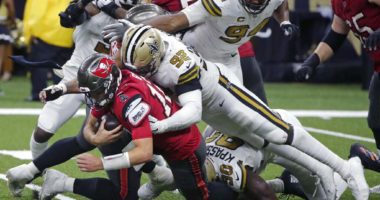Sports Betting In Florida Struck Down By Federal Court Ruling

The Seminole Tribe of Florida’s “motion to stay” and ordered shutdown of sports betting in the state was rejected on Wednesday by the same judge that ruled its 30-year gambling compact there invalid.
Federal District Court Judge Dabney L. Friedrich had ruled late last Monday night that the Seminoles’ deal violated the Indian Gaming Regulatory Act and nullified it entirely. The Department of the Interior, not the Seminole Tribe of Florida was the defendant in the case. The Tribe also filed a notice of appeal. In the stay request, it declared: “Federal Defendants state that they take no position on the Tribe’s Motion.”
The appeal is to be heard this week by a three-judge appellate panel.
West Flagler Associates and Bonita-Fort Myers Associates, pari-mutuels operators, have been ordered to file any new responses by Nov. 30. The Seminole Tribe would have a day to offer a retort.
The initial ruling from the District of Columbia circuit was an emphatic rebuke of a deal brokered by Gov. Ron DeSantis. The Seminoles discreetly launched online mobile sp
orts betting on Nov. 1.
Despite requesting and being denied a stay, the Seminoles through their Hard Rock Digital sports betting app were still accepting wagers and soliciting deposits in Florida as of Nov. 29.
Full opinion here.
While sports betting in Florida somehow continues, Hard Rock sports betting advertising was banned there by Google on Nov. 24, per an update to the company’s ‘gambling and games‘ policy.
Why did a judge invalidate Seminole sports betting compact?
Friedrich ultimately agreed with plaintiffs West Flagler Associates that the so-called “hub-and-spoke” model the Seminoles used to offer state-wide sports betting did not conform to federal law despite tacit approval in August by the Department of the Interior’s Bureau of Indian Affairs. Under this unprecedented system, the Seminoles have offered mobile wagering to bettors anywhere in the state using servers located on Tribal lands at their Hollywood, Fla., property.
Precedent has established that bets are placed where the bettor is located, not where the server that handles them is situated. Compacts negotiated with tribes allow for wagering activities to be conducted only on tribal lands. Tribes in other states have gained the right to offer gambling outside their property by negotiating beyond the compact, or if the state legalized sports betting through political means. Sports betting became legal in Florida only by the auspices of the compact and a successful 2019 constitutional amendment limits the expansion of gambling without voter approval.
Wrote Friedrich: “Although the Compact ‘deem[s]’ all sports betting to occur at the location of the Tribe’s ‘sports book’ and supporting servers … this Court cannot accept that fiction. … When a federal statute authorizes an activity only at specific locations, parties may not evade that limitation by ‘deeming’ their activity to occur where it, as a factual matter, does not.”
The Seminole Tribe was not a plaintiff in the case. West Flagler Associates, which owns two South Florida pari-mutuel facilities, and Monterra MF sued Secretary of the Interior Deb Haaland, whose assistant secretary, Bryan Newland, quasi-signed off on the compact. The vacated compact would have seen the Seminoles pay $500 million yearly to Florida for the monopoly on sports betting and the addition of craps and roulette at its six state casinos.
Hard Rock-branded craps and roulette tables were stationed on the casino floor at Seminole Hard Rock & Casino Tampa on Wednesday but were not in use.
“We are reviewing the court’s perplexing ruling, which certainly contains appealable issues,” Christina Pushaw, a spokesperson for DeSantis, was quoted in a Politico post. “Because neither the Seminole Tribe nor the state of Florida are parties to the case, it is unclear what if any immediate impact the ruling has in Florida. We look forward to working with the tribe to ensure the future success of the compact.”
New deal is void, says judge
The tribe loses those rights and the ability to offer retail sports betting with Friedrich completely voiding the new deal. Instead, gaming in the state reverts, according to the judge, to the previous compact, which took effect in 2010. Under that deal, the Seminoles agreed to pay $350 million annually, but halted payments when the state refused to stop card rooms from offering banked card games the courts rules were their province, exclusively.
According to the ruling:
In the Court’s understanding, the practical effect of this remedy is to reinstate the Tribe’s
prior gaming compact, which took effect in 2010, see Indian Gaming, 75 Fed. Reg. 38,833 (July
6, 2010), and which may remain in effect until 2030, see Compl. Ex. D. (Prior Compact)
§ XVI(B), Dkt. 1-4 (West Flagler). See Fl. Stat. § 285.710(3)(b). In that respect, this decision
restores the legal status of class III gaming in Florida to where it was on August 4, 2021—one
day before the Secretary approved the new compact by inaction. Because the more recent
Compact is no longer in effect, continuing to offer online sports betting would violate federal
law. See 25 U.S.C. § 2710(d)(1)(C) (providing that “[c]lass III gaming activities shall be lawful
on Indian lands only if . . . [they are] conducted in conformance with a Tribal-State compact . . .
that is in effect”).
The Seminoles case for seeking a stay
According to the motion to stay, the Seminole Tribe claims it will suffer “irreparable harm” without it and cites a potential “substantial blow to the Tribe’s Sovereign and Economic Interests.” They deem any harm to the plaintiffs as “speculative at best.” The finances of the Seminoles and their global Hard Rock International brand are not often public record, but the company offered some morsels in the filing.
Among the financial outlays cited in court documents:
-
“On October 15, the Tribe made its first revenue sharing payment under the Compact of $37.5 million to the State. The Tribe made a second payment of $37.5 million on November 15. The Tribe was obligated to begin making these payments even before it began generating revenue from the new forms of gaming authorized under the Compact.”
-
“The Tribe was permitted to add craps and roulette when the Compact took effect on August 11, 2021. The Tribe has hired scores of employees and purchased equipment in preparation to formally launch craps and roulette this month. To date, the Tribe has spent hundreds of thousands of dollars preparing to launch craps and roulette. If the Tribe were prevented from launching those new games it would lose a significant investment in resources and personnel.”
-
“The Tribe has developed its online sportsbook through its vendor Seminole Hard Rock Digital, LLC (“Seminole HRD”) which is majority owned by the Tribe through its ownership of Hard Rock International. To date, over $25 million has been spent to develop the Tribe’s online sportsbook. This amount is anticipated to grow to over $45 million by the end of the year.”
-
“The Tribe has also made significant investments to its workforce to implement the online sports betting authorized in the Compact. In addition to the Tribe’s own employees, Seminole HRD has 237 employees, has hired 30 more who have not yet started, and has 35 vacancies. In addition, the Tribe has outsourced 146 customer service representatives and has engaged more than 50 outside suppliers and vendors.”
-
“The Tribe’s online sports betting authorized by th
e Compact is now in operation, and is generating millions in revenue per week. The Tribe is using these funds to pay back the development costs for its online sportsbook, make revenue sharing payments to the State and fund important tribal programs.” -
” The Tribe would be irreparably injured if it is required to cease online sports betting pending the outcome of an appeal. The Tribe would immediately lose the millions in online sports betting revenues the Tribe is generating. As a result, many of these jobs and outsourced position would be lost.”
-
“In addition, if the Tribe is not permitted to operate under the 2021 Compact during an appeal, then the State would lose tens of millions per month in revenue sharing payments from the Tribe.”
What to watch for now
- Will the Hard Rock Digital app cease accepting wagers? Customers can withdraw their funds but the Seminole Tribe did not offer Playin USA its plans for pending wagers.
- As noted in the Politico piece, will DeSantis need to solicit the aid of adversary President Joe Biden?
- Multiple parimutuel outlets had negotiated deals with the Seminoles to offer sports betting through ‘marketing’ agreements. Those lifeline deals are now off.
- The low rumble of lobbying from outside sports betting interests shut out under the now void compact figures to become a marketing din. That means Floridians are likely to hear a lot more from DraftKings and FanDuel and their hope for the legalization of sports betting in the state of 22.5 million.
- Said Christina Johnson, of Florida Education Champions, which supports broader sports betting legalization in Florida: “Our effort was always mutually exclusive from the compact. Florida Education Champions’ focus remains in securing the nearly 900,000 valid petitions to make the November 2022 ballot. Now is the time for all entities to come together so we may provide a competitive legal sports betting market for Floridians, while generating the expected hundreds of millions of dollars in annual revenues for the Florida Educational Enhancement Trust Fund.”
Background reading on the Seminole Tribe of Florida and sports betting case
- The Seminoles aren’t used to losing
- Seminoles never launched retail sports betting
- Tribal experts always thought hub-and-spoke was ‘kind of vulnerable’










